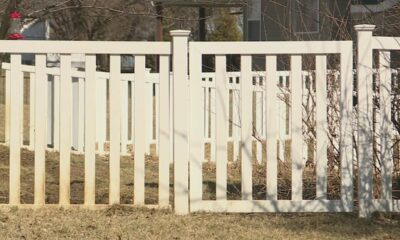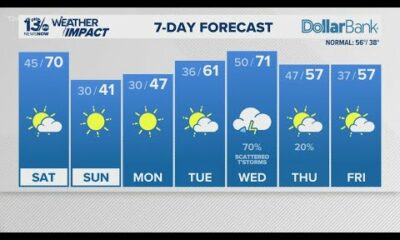Kaiser Health News
Newsom Offers a Compromise to Protect Indoor Workers from Heat
Samantha Young
Thu, 18 Apr 2024 23:15:57 +0000
SACRAMENTO, Calif. — Gov. Gavin Newsom’s administration has compromised on long-sought rules that would protect indoor workers from extreme heat, saying tens of thousands of prison and jail employees — and prisoners — would have to wait for relief.
The deal comes a month after the administration unexpectedly rejected sweeping heat standards for workers in sweltering warehouses, steamy kitchens, and other dangerously hot job sites. The rules had been years in the making, and a state worker safety board voted to adopt them March 21. But in a controversial move, the administration upended the process by saying the cost to cool state prisons was unclear — and likely very expensive.
So the Democratic administration said the rules can proceed but must exempt tens of thousands of workers at 33 state prisons, conservation camps, and local jails, “in recognition of the unique implementation challenges,” said Eric Berg, of California’s Division of Occupational Safety and Health, at a Thursday hearing. A separate regulation will be drafted for correctional facilities, which could take a year, if not longer.
It’s unclear if the standards will become law in time to protect millions of other workers from summer’s intensifying heat. The compromise rules must go through a 15-day public comment period, and legal reviews within 100 days, which could push implementation well into summer. But that can’t even happen until the original regulation is rejected by the Office of Administrative Law, which has until next month.
“Summer is arriving, and many workers, unfortunately, are going to suffer heat conditions,” said Tim Shadix, legal director at the Warehouse Worker Resource Center. “Some will likely get really sick, potentially even die from heat illness, while we continue to wait for the standard.”
Berg told members of the Occupational Safety and Health Standards Board on April 18 that Cal/OSHA would try to accelerate the timeline and get protections in place for summer.
California has had heat standards on the books for outdoor workers since 2005, and rules for indoor workplaces have been in the works since 2016. The proposed standards would require work sites to be cooled below 87 degrees Fahrenheit when employees are present and below 82 degrees in places where workers wear protective clothing or are exposed to radiant heat, such as furnaces. Buildings could be cooled with air conditioning, fans, misters, and other methods.
The rules allow workarounds for businesses that can’t cool their workplaces sufficiently, such as laundries or restaurant kitchens.
Because the rules would have a sweeping economic impact, state law requires Newsom’s Department of Finance to sign off on the financial projections, which it refused to do last month when it was unclear how much the regulations would cost state prisons. The California Department of Corrections and Rehabilitation said implementing the standards in its prisons and other facilities could cost billions, but the board’s economic analysis pegged the cost at less than $1 million a year.
Department of Finance spokesperson H.D. Palmer couldn’t promise that the compromise rules would be signed off on, but “given that the earlier correctional estimates were the issue before, not having them in the revised package would appear to address that issue,” he said.
Business and agricultural groups complained repeatedly during the rulemaking process that complying with the rules would burden businesses financially. At the April 18 hearing, they highlighted the administration’s lack of transparency and questioned why one sector should be given an exemption over another.
“The massive state costs that are of concern, specifically around prisons in the billions of dollars, are also costs that California employers will bear,” said Robert Moutrie, a senior policy advocate at the California Chamber of Commerce.
Labor advocates asked board members not to exempt prisons, saying corrections workers need protection from heat, too.
“It’s a huge concern that prison workplaces all over are being excluded from the heat standard, leaving out not just guards, but also nurses, janitors, and the other prison workers across California unprotected from heat,” said AnaStacia Nicol Wright, an attorney with Worksafe, a workplace safety advocacy nonprofit. “California needs to prioritize the safety and well-being of their workers, regardless of whether they work in corrections, a farm, or a sugar refinery.”
Prisons will continue to provide cooling stations in air-conditioned areas, and make water stations, fans, portable cooling units, and ice more available to workers, according to the California Department of Corrections and Rehabilitation. Prison housing units, which house roughly 94,000 inmates as of January, all can be cooled, usually with evaporative coolers and fans.
Only Minnesota and Oregon have adopted heat rules for indoor workers. Legislation has stalled in Congress, and even though the Biden administration has initiated the long process of establishing national heat standards for outdoor and indoor work, they may take years to finalize.
Seven workers died in California from indoor heat between 2010 and 2017. Heat stress can lead to heat exhaustion, heatstroke, cardiac arrest, and kidney failure. In 2021, the Centers for Disease Control and Prevention reported, 1,600 heat-related deaths occurred nationally, which is likely an undercount because health care providers are not required to report them. It’s not clear how many of these deaths are related to work, either indoors or outdoors.
“These are not overly cumbersome things to implement, and they are easy ways to keep people safe and healthy,” said Jessica Early, patient advocacy coordinator at the National Union of Healthcare Workers. “Now is the urgent time to make our workplaces safer and more resilient in the face of rising temperatures.”
This article was produced by KFF Health News, which publishes California Healthline, an editorially independent service of the California Health Care Foundation.
——————————
By: Samantha Young
Title: Newsom Offers a Compromise to Protect Indoor Workers from Heat
Sourced From: kffhealthnews.org/news/article/newsom-indoor-heat-standards-compromise-prisons/
Published Date: Thu, 18 Apr 2024 23:15:57 +0000
Did you miss our previous article…
https://www.biloxinewsevents.com/too-big-to-fail-now-its-too-big-to-hack/
Kaiser Health News
Home Improvements Can Help People Age Independently. But Medicare Seldom Picks Up the Bill.
Chikao Tsubaki had been having a terrible time.
In his mid-80s, he had a stroke. Then lymphoma. Then prostate cancer. He was fatigued, isolated, not all that steady on his feet.
Then Tsubaki took part in an innovative care initiative that, over four months, sent an occupational therapist, a nurse, and a handy worker to his home to help figure out what he needed to stay safe. In addition to grab bars and rails, the handy worker built a bookshelf so neither Tsubaki nor the books he cherished would topple over when he reached for them.
Reading “is kind of the back door for my cognitive health — my brain exercise,” said Tsubaki, a longtime community college teacher. Now 87, he lives independently and walks a mile and a half almost every day.
The program that helped Tsubaki remain independent, called Community Aging in Place: Advancing Better Living for Elders, or CAPABLE, has been around for 15 years and is offered in about 65 places across 26 states. It helps people 60 and up, and some younger people with disabilities or limitations, who want to remain at home but have trouble with activities like bathing, dressing, or moving around safely. Several published studies have found the program saves money and prevents falls, which the Centers for Disease Control and Prevention says contribute to the deaths of 41,000 older Americans and cost Medicare about $50 billion each year.
Despite evidence and accolades, CAPABLE remains small, serving roughly 4,600 people to date. Insurance seldom covers it (although the typical cost of $3,500 to $4,000 per client is less than many health care interventions). Traditional Medicare and most Medicare Advantage private insurance plans don’t cover it. Only four states use funds from Medicaid,the federal-state program for low-income and disabled people. CAPABLE gets by on a patchwork of grants from places like state agencies for aging and philanthropies.
The payment obstacles are an object lesson in how insurers, including Medicare, are built around paying for doctors and hospitals treating people who are injured or sick — not around community services that keep people healthy. Medicare has billing codes for treating a broken hip, but not for avoiding one, let alone for something like having a handy person “tack down loose carpet near stairs.”
And while keeping someone alive longer may be a desirable outcome, it’s not necessarily counted as savings under federal budget rules. A 2017 Centers for Medicare & Medicaid Services evaluation found that CAPABLE had high satisfaction rates and some savings. But its limited size made it hard to assess the long-term economic impact.
It’s unclear how the Trump administration will approach senior care.
The barriers to broader state or federal financing are frustrating, said Sarah Szanton, who helped create CAPABLE while working as a nurse practitioner doing home visits in west Baltimore. Some patients struggled to reach the door to open it for her. One tossed keys to her out of a second-story window, she recalled.
Seeking a solution, Szanton discovered a program called ABLE, which brought an occupational therapist and a handy worker to the home. Inspired by its success, Szanton developed CAPABLE, which added a nurse to check on medications, pain, and mental well-being, and do things like help participants communicate with doctors. It began in 2008. Szanton since 2021 has been the dean of Johns Hopkins University School of Nursing, which coordinates research on CAPABLE. The model is participatory, with the client and care team “problem-solving and brainstorming together,” said Amanda Goodenow, an occupational therapist who worked in hospitals and traditional home health before joining CAPABLE in Denver, where she also works for the CAPABLE National Center, the nonprofit that runs the program.
CAPABLE doesn’t profess to fix all the gaps in U.S. long-term care, and it doesn’t work with all older people. Those with dementia, for example, don’t qualify. But studies show it does help participants live more safely at home with greater mobility. And one study that Szanton co-authored estimated Medicare savings of around $20,000 per person would continue for two years after a CAPABLE intervention.
“To us, it’s so obvious the impact that can be made just in a short amount of time and with a small budget,” said Amy Eschbach, a nurse who has worked with CAPABLE clients in the St. Louis area, where a Medicare Advantage plan covers CAPABLE. That St. Louis program caps spending on home modifications at $1,300 a person.
Both Hill staff and CMS experts who have looked at CAPABLE do see potential routes to broader coverage. One senior Democratic House aide, who asked not to be identified because they were not allowed to speak publicly, said Medicare would have to establish careful parameters. For instance, CMS would have to decide which beneficiaries would be eligible. Everyone in Medicare? Or only those with low incomes? Could Medicare somehow ensure that only necessary home modifications are made — and that unscrupulous contractors don’t try to extract the equivalent of a “copay” or “deductible” from clients?
Szanton said there are safeguards and more could be built in. For instance, it’s the therapists like Goodenow, not the handy workers, who put in the work orders to stay on budget.
For Tsubaki, whose books are not only shelved but organized by topic, the benefits have endured.
“I became more independent. I’m able to handle most of my activities. I go shopping, to the library, and so forth,” he said. His pace is slow, he acknowledged. But he gets there.
Kenen is the journalist-in-residence and a faculty member at Johns Hopkins University School of Public Health. She is not affiliated with the CAPABLE program.
The post Home Improvements Can Help People Age Independently. But Medicare Seldom Picks Up the Bill. appeared first on kffhealthnews.org
Kaiser Health News
A Runner Was Hit by a Car, Then by a Surprise Ambulance Bill
Jagdish Whitten was on a run in July 2023 when a car hit him as he crossed a busy San Francisco street. Whitten, then 25, described doing “a little flip” over the vehicle and landing in the street before getting himself to the curb.
Concerned onlookers called an ambulance. But Whitten instead had friends pick him up and take him to a nearby hospital, the Helen Diller Medical Center, operated by the University of California-San Francisco.
“I knew that ambulances were expensive, and I didn’t think I was going to die,” he said.
Whitten said doctors treated him for a mild concussion, a broken toe, and bruises.As he sat in a hospital bed, attached to an IV and wearing a neck brace, Whitten said, doctors told him that because he had suffered a traumatic injury, they had to send him by ambulance to the city’s only trauma center, Zuckerberg San Francisco General Hospital.
After a short ambulance ride, Whitten said, emergency room doctors checked him out, told him he had already received appropriate treatment, and released him.
Then the bill came.
The Medical Procedure
Traumatic injuries are those that threaten life or limb, and some facilities specialize in providing care for them. For someone hit by a car, that can include stabilizing vital signs, screening for internal injuries, and treating broken bones and concussions. Zuckerberg Hospital is a Level 1 trauma center, meaning it can provide any care needed for severely injured patients.
In emergency medicine, it is standard to transfer patients to centers best equipped to provide care. Ambulances are typically used for transfers because they are able to handle trauma patients, with tools to aid in resuscitation, immobilization, and life support.
At the first hospital, Whitten said, doctors performed a thorough workup, including a CT scan and X-rays, and advised him to follow up with his primary care physician and an orthopedic doctor. He was evaluated at the second hospital and released without additional treatment, he said.
The Final Bill
$12,872.99 for a 6-mile ambulance ride between hospitals: a $11,670.11 base rate, $737.16 for mileage, $314.45 for EKG monitoring, and $151.27 for “infection control.”
The Billing Problem: Surprise Bills Are Common With Ground Ambulances
Ground ambulance services are operated by a hodgepodge of private and public entities — with no uniform structure, or regulatory oversight, for billing — and most function outside insurance networks. Patients don’t typically have a choice of ambulance provider.
There are state and federal laws shielding patients from out-of-network ambulance bills, but none of those protections applied in Whitten’s case.
Whitten was insured under his father’s employer-sponsored health plan from Anthem Blue Cross. So when he received a nearly $13,000 bill months after his short transfer ride, he sent a photo of it to his dad.
Brian Whitten said the bills from the two hospitals — and the family’s out-of-pocket responsibility — were in line with what he had anticipated. But he was stunned by his son’s ambulance bill from AMR, one of the nation’s largest ambulance providers. Anthem Blue Cross denied the claim, saying the ambulance was out-of-network and required pre-authorization.
“It didn’t make a whole lot of sense to me, because the doctor is the one who put him in the ambulance,” Brian Whitten said. “It’s not like somehow he just decided, ‘Hey, can I take an ambulance ride?’”
Kristen Bole, a UCSF spokesperson, said in a statement that the health system’s standard of care is to stabilize patients and, when appropriate, transfer them to other medical facilities that are most appropriate to care for patients’ needs, adding that ambulance transfers between hospitals are standard practice.
While the medical system at large relies on negotiated prices for services, ambulance services operate largely outside of the competitive marketplace, said Patricia Kelmar, senior director of health care campaigns for PIRG, a nonpartisan consumer protection and good-government advocacy organization.
Ambulance transfers between hospitals to ensure the highest quality of care available are fairly common, Kelmar said. And with many hospitals being purchased and consolidated, it would follow that the number of ambulance transfers between facilities could increase as specialized medical units at any given hospital are downsized or eliminated, she said.
According to a study of private insurance claims data conducted in 2023, about 80% of ground ambulance rides resulted in out-of-network billing.
Generally, out-of-network providers may charge patients for the remainder of their bill after insurance pays. In some cases, patients can be on the hook even when they did not knowingly choose the out-of-network provider. These bills are known as “surprise” bills.
“It’s a financial burden, a significant financial burden,” said Kelmar, who is a member of the committee created to advise federal lawmakers on surprise bills and emergency ambulance transportation.
Eighteen states have implemented laws regulating surprise ambulance billing. A California law cracking down on surprise ambulance billing took effect on Jan. 1, 2024 — months after Jagdish Whitten’s ambulance ride.But Kelmar said those state laws don’t really help people with employer-sponsored insurance, because those plans are beyond state control — which is why federal legislation is so important, she said.
As of 2022, federal law protects patients from receiving some surprise bills, especially for emergency services. But while lawmakers included protections against air ambulance bills in the law, known as the No Surprises Act, they excluded ground ambulance transports.
The Resolution
Whitten’s father filed an insurance appeal on his son’s behalf, which Anthem granted. The insurer paid AMR $9,966.60.
Michael Bowman, a spokesperson for Anthem, said AMR had not submitted all the information it required to process the claim, leading to the initial denial. After consulting with AMR, Anthem paid its coverage amount, Bowman said.
But the insurer’s payment still left Whitten with a $2,906.39 bill for his out-of-network ambulance ride. Brian Whitten said he called an AMR customer service number several times to contest the remaining charges but was unable to bypass its automated system and speak with a human.
“I couldn’t find a way to talk to somebody about this bill other than how to pay it, and I didn’t want to pay it,” he said.
Unsuccessful and frustrated, Brian Whitten paid the remaining bill in January 2024, he said, concerned it would be turned over to a collection agency and hurt his son’s credit — and his well-being.
There was one more twist: He was shocked when he later reviewed his credit card statements and discovered that AMR had quietly but fully refunded his payment in October.
“It’s amazing that he got his money back,” Kelmar said. “That’s what’s shocking.”
In a statement, Suzie Robinson, vice president of revenue cycle management with AMR, said the company’s third-party billing agency regularly performs audits to ensure accuracy. An audit of Jagdish Whitten’s bill “revealed that the care provided did not meet the criteria for critical care,” Robinson said, which prompted the full refund.
Robinson said audits indicated fewer than 1% of its 4 million medical encounters annually are billed incorrectly.
The Takeaway
Robinson said patients who feel that AMR has billed them incorrectly should contact the company via email.
For patients in need of an ambulance in an emergency, there are few protections — and usually few options: Sometimes you don’t have a better choice than to get in.
Federal protections require that health plans cover certain surprise bills, with patients paying only what they would if they had received in-network care. Expanding those protections to ground ambulance bills would require Congress to act.
Ambulance providers deserve to be appropriately compensated for their vital role in our medical system, Kelmar said. But the system as it stands almost incentivizes providers to charge a higher rate, which can lead to surprise billing and financial hardship for patients and their families, she said.
Kelmar said she worries not just about the debt those bills create for consumers but also that people may decline vital ambulance transportation in an emergency, for fear of getting hit with an exorbitant bill.
“We just need to bring some sense back to the system,” she said.
Bill of the Month is a crowdsourced investigation by KFF Health News and The Washington Post’s Well+Being that dissects and explains medical bills. Since 2018, this series has helped many patients and readers get their medical bills reduced, and it has been cited in statehouses, at the U.S. Capitol, and at the White House. Do you have a confusing or outrageous medical bill you want to share? Tell us about it!
KFF Health News is a national newsroom that produces in-depth journalism about health issues and is one of the core operating programs at KFF—an independent source of health policy research, polling, and journalism. Learn more about KFF.
USE OUR CONTENT
This story can be republished for free (details).
The post A Runner Was Hit by a Car, Then by a Surprise Ambulance Bill appeared first on kffhealthnews.org
Kaiser Health News
Republicans Once Wanted Government out of Health Care. Trump Voters See It Differently.
Like many Americans who voted for Donald Trump, Jason Rouse hopes the president’s return will mean lower prices for gas, groceries, and other essentials.
But Rouse is looking to the federal government for relief from one particular pain point: high health care costs. “The prices are just ridiculous,” said Rouse, 53, a retired Michigan firefighter and paramedic who has voted for Trump three times. “I’d like to see a lower cap on what I have to pay out-of-pocket.”
Government regulation of health care prices used to be heresy for most Republicans. GOP leaders fiercely opposed the 2010 Affordable Care Act, which included government limits on patients’ costs. More recently, the party fought legislation signed by former President Joe Biden to cap prescription drug prices.
But as Trump begins his second term, many of the voters who sent him back to the White House welcome more robust government action to rein in a health care system many Americans perceive as out of control, polls show.
“That idea that government should just keep its hands off, even when things are tough for people, has kind of lost its sheen,” said Andrew Seligsohn, president of Public Agenda, a nonprofit that has studied public attitudes about government and health care.
“We’re wandering around the country with a set of old, outdated frameworks about what ordinary Democrats and ordinary Republicans like,” he said.
Republican voters strongly back federal limits on the prices charged by drug companies and hospitals, caps on patients’ medical bills, and restrictions on how health care providers can pursue people over medical debt.
Even Medicaid, the state-federal insurance program that Republican congressional leaders are eyeing to dramatically cut, is viewed favorably by many GOP voters, like Ashley Williamson.
Williamson, 37, a mother of five in eastern Tennessee who voted for Trump, said Medicaid provided critical assistance when her mother-in-law needed nursing home care. “We could not take care of her,” Williamson said. “It stepped in. It made sure she was taken care of.”
Williamson, whose own family gets coverage through her husband’s employer, said she would be very concerned by large cuts in Medicaid funding that could jeopardize coverage for needy Americans.
For years, Republican ideas about health care reflected a broad skepticism about government and fears that government would threaten patients’ access to physicians or lifesaving medicines.
“The discussions 10 to 15 years ago were all around choice,” said Christine Matthews, a Republican pollster who has worked for numerous GOP politicians, including former Maryland governor Larry Hogan. “Free market, not having the government limit or take over your health care.”
Matthews and fellow pollster Mike Perry recently convened and paid for several focus groups with Trump voters, including Rouse and Williamson, which KFF Health News observed.
Skepticism about government lingers among rank-and-file Republicans. And ideas such as shifting all Americans into a single government health plan, akin to “Medicare for All,” are still nonstarters for many GOP voters.
But as tens of millions of Americans are driven into debt by medical bills they don’t understand or can’t afford, many are reassessing their inclination to look to free markets rather than the government, said Bob Ward, whose firm, Fabrizio Ward, polled for Trump’s 2024 campaign.
“I think most people look at this and say the market is broken, and that’s why they’re willing for someone, anyone, to step in,” he said. “The deck is stacked against folks.”
In a recent national survey, Fabrizio Ward and Hart Research, which for decades has polled for Democratic candidates, found that Trump voters were more likely to blame health insurers, drug companies, and hospital systems than the government for high health care costs.
Sarah Bognaski, 31, an administrative assistant in upstate New York, is among the many Trump voters who say they resent profiteering by the health care industry. “I don’t think there is any reason a lot of the costs should be as high as they are,” Bognaski said. “I think it’s just out of pure greed.”
High health care costs have had a direct impact on Bognaski, who was diagnosed four years ago with Type 1 diabetes, a condition that makes her dependent on insulin. She said she’s ready to have the government step in and cap what patients pay for pharmaceuticals. “I’d like to see more regulation,” she said.
Charles Milliken, a retired auto mechanic in West Virginia, who said he backed Trump because the country “needs a businessman, not a politician,” expects the new president to go even further.
“I think he’s going to put a cap on what insurance companies can charge, what doctors can charge, what hospitals can charge,” said Milliken, 51, who recently had a heart attack that left him with more than $6,000 in medical debt.
Three-quarters of Trump voters back government limits on what hospitals can charge, Ward’s polling found.
And about half of Trump voters in a recent KFF poll said the new administration should prioritize expanding the number of drugs whose price is set through negotiation between the federal Medicare program and drug companies, a program started under the Biden administration.
Perry, who’s convened dozens of focus groups with voters about health care in recent years, said the support for government price caps is all the more remarkable since regulating medical prices isn’t at the top of most politicians’ agenda. “It seems to be like a groundswell,” he said. “They’ve come to this decision on their own, rather than any policymakers leading them there, that something needs to be done.”
Other forms of government regulation, such as limits on medical debt collections, are even more popular.
About 8 in 10 Republicans backed a $2,300 cap on how much patients could be required to pay annually for medical debt, according to a 2023 survey by Perry’s polling firm, PerryUndem. And 9 in 10 favored a cap on interest rates charged on medical debt.
“These are what I would consider no-brainers, from a political perspective,” Ward said.
But GOP political leaders in Washington have historically shown little interest in government limits on what patients pay for medical care. And as Trump and his allies in Congress begin shaping their health care agenda, many Republican leaders have expressed more interest in cutting government than in expanding its protections.
“There is oftentimes a massive disconnect,” Ward said, “between what happens in the caucuses on Capitol Hill and what’s happening at family tables across America.”
We’d like to speak with current and former personnel from the Department of Health and Human Services or its component agencies who believe the public should understand the impact of what’s happening within the federal health bureaucracy. Please message KFF Health News on Signal at (415) 519-8778 or get in touch here.
The post Republicans Once Wanted Government out of Health Care. Trump Voters See It Differently. appeared first on kffhealthnews.org
-

 News from the South - Virginia News Feed5 days ago
News from the South - Virginia News Feed5 days agoVirginia woman getting ready to celebrate 100th birthday: 'I have really enjoyed life'
-

 News from the South - Missouri News Feed7 days ago
News from the South - Missouri News Feed7 days agoSt. Peters HOA spends thousands suing homeowners for their fences
-

 Mississippi Today6 days ago
Mississippi Today6 days agoSenate passes redistricting that puts DeSoto Republican, Tunica Democrat in same district, calls for 10 new elections
-

 News from the South - North Carolina News Feed7 days ago
News from the South - North Carolina News Feed7 days agoDays after woman, 2 children stabbed to death, Fayetteville community still in shock
-

 News from the South - Florida News Feed2 days ago
News from the South - Florida News Feed2 days ago4 killed, 1 hurt in crash after car attempts to overtake another in Orange County, troopers say
-

 News from the South - Texas News Feed7 days ago
News from the South - Texas News Feed7 days agoShocking audio reveals moments before Southwest plane nearly collides with jet
-

 Mississippi Today5 days ago
Mississippi Today5 days agoMississippi private prison OK’d to hold more ICE detainees
-

 News from the South - Virginia News Feed4 days ago
News from the South - Virginia News Feed4 days agoStorm chances Wednesday, rollercoaster temperatures this weekend













































